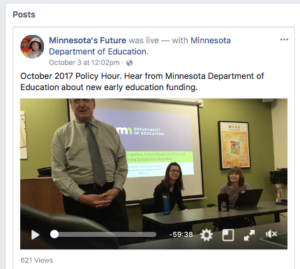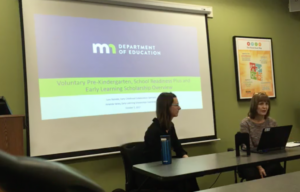By Marie Huey, Public Policy and Advocacy Coordinator
Representatives from the Minnesota Department of Education (MDE) presented at the first Policy Hour of the season. June Reineke and Amanda Varley shared updates on changes to early education policy and funding from the 2017 legislative session.
Early Learning Scholarships
Early Learning Scholarships are funds used to increase access to high-quality early childhood programs for three to five year olds and zero to two year olds in some circumstances. They aim to support kindergarten readiness for children with the highest needs.
Pathway I Scholarships are awarded to eligible children through an Area Administrator. Parents choose the program where they would like to use the scholarship. Pathway II Scholarships are awarded to children through a Four Star Parent Aware rated early childhood site. Programs apply to receive the Pathway II funds.
Varley noted the impressive expansion of scholarship funding, which started out as $2 million for select areas in 2013 and is now a $70.2 million statewide program. They will serve an estimated 16,000 children in the current fiscal year (July 1, 2017 to June 30, 2018).
One recent change that MDE made administratively is that programs receiving Pathway II funds will now apply every other year instead of annually. This simplifies the administrative process and provides more predictable funding for programs. This year there was an increase in the number of Family Child Care programs applying for Pathway II Scholarships.
Several legislative changes to Early Learning Scholarships occurred during the 2017 session. Legislators allocated an additional $20 million for Pathway I Scholarships. They extended to July 1, 2020 the rule that mandates only programs with a Three or Four Star Parent Aware rating are eligible to receive scholarships. The current maximum amounts that programs can receive is based on their star rating.
| Parent Aware Program Rating Level | Scholarship Award |
| Four-Star Parent Aware Rating | Up to $7,500 per child |
| Three-Star Parent Aware Rating | Up to $5,000 per child |
| One or Two-Star Parent Aware Rating | Up to $4,000 per child |
| Currently in a Full-Rating Pathway Cohort | Up to $3,000 per child |
There were also some changes to who can receive Early Learning Scholarships. Children birth to five who have experienced homelessness in the past 24 months, are in foster care, or are in need of child protective services are now a priority for receiving scholarships. MDE uses the McKinney-Vento definition of homelessness. Scholarship Area Administrators were asked to reserve 30% of their funds for children in these new priority categories. They are already seeing a large increase in children from those categories receiving scholarships. Two area administrators are now tribes, so they also expect to see more American Indian children served.
To see more about how and where scholarships are used, view the report.
Early Learning Scholarships Use in Minnesota Mid State Fiscal Year 2017 (3/23/17)
Voluntary Pre-K (VPK) and School Readiness Plus
Reineke addressed the roll out of new preschool money over the summer. The legislature approved $50 million in new funds. This new preschool money is available for two years only.
This year the funds were awarded to school districts and charter schools based on a seat limit instead of a funding limit. Programs knew they were receiving funding for a certain number of children (16, 30, etc) which was different from the previous year.
For receiving 2017-18 new preschool funding, all applications meeting program requirements were rank-ordered based on three criteria:
- Free and reduced lunch concentration of students in kindergarten at the site as of October 1 of the previous fiscal year;
- Proximity of a three-or four-star Parent Aware rated program; and
- Whether the district has implemented a mixed delivery program. MDE defines a mixed delivery system as a district or charter school contracting with a Head Start, child care center, family child care program or community-based organization for delivery of a school readiness plus or voluntary pre-k program
Funding was divided into four groups identified legislatively and based on total state kindergarten enrollment:
- Minneapolis and St. Paul School Districts 10%
- Metro Suburban School Districts 40%
- Non-Metro School Districts 43%
- Charter Schools 7%
The timeline for awarding the new money went very fast. MDE worked quickly to meet the legislative requirements. In early June districts and charter schools funded initially in 2016-17 were notified of their renewal. Districts and charter schools that applied for new pre-school funding were notified by August 1 of the awards. School Readiness Plus and Voluntary Pre-K have many similar program requirements, but there are a few differences. You can view a Comparison Chart of the programs here.
Preschool Program Comparison Chart (6/22/17)
Programs already receiving VPK funds were able to renew, and all 102 sites with 3,160 children did. An additional 3,000 seats were awarded. Those seats were split between VPK and School Readiness Plus (SRP).
| Program | Site Applications | District Allocations | # of Sites | Seats Allocated |
| FY 2018 VPK NEW | 242 | 43 | 81 | 2660 |
| FY 2018 SRP NEW | 85 | 11 | 14 | 340 |
School districts or charters could apply to receive the funding. One district could apply for more than one school site within the district. Next year in January, districts and charters will be able to apply for 1,000 more seats. Total children served annually by VPK and School Readiness Plus will then be 7,160.
Voluntary pre-kindergarten and school readiness plus money is allocated as a new grade level and funding is disbursed on the same schedule as K-12. Children who attend a voluntary pre-K or school readiness plus programs receive MARSS identification numbers. Money is allocated to children participating in VPK or SRP in the same way as it is allocated to children participating in grades K-12. In some cases, this results in children generating additional funding in support of their early education.
Mixed Delivery
About 14 applications this year included mixed delivery. Of those, 6 received funding. Four of the awarded mixed delivery partnerships are with Head Start, and two are with child care centers. Several Policy Hour attendees asked about mixed delivery and expressed disappointment that more sites aren’t using that option. Reineke pointed out that there are more mixed delivery sites this year than last, and that the tight timeline made it difficult for more collaboration to happen. MDE is  very interested in facilitating additional mixed delivery programs, and they are creating a Mixed Delivery Toolkit to support principals and districts to create partnerships with community programs. MDE is also spending more time intentionally collaborating with the Department of Human Services because of the
very interested in facilitating additional mixed delivery programs, and they are creating a Mixed Delivery Toolkit to support principals and districts to create partnerships with community programs. MDE is also spending more time intentionally collaborating with the Department of Human Services because of the
overlap in this area.
To view the slideshow from the event, click HERE.
Policy Hour was presented on Facebook Live. To view the recording, click HERE.










